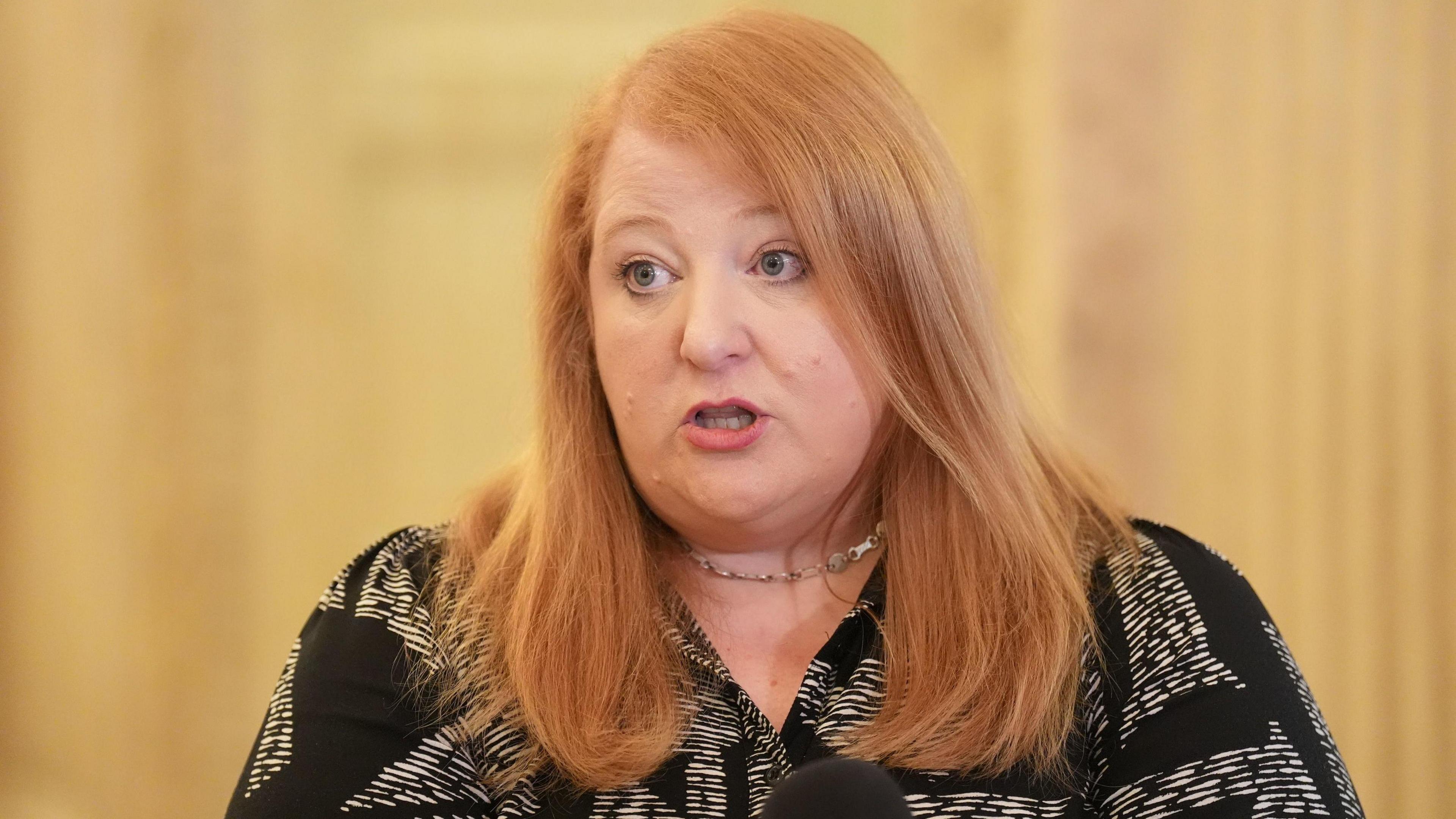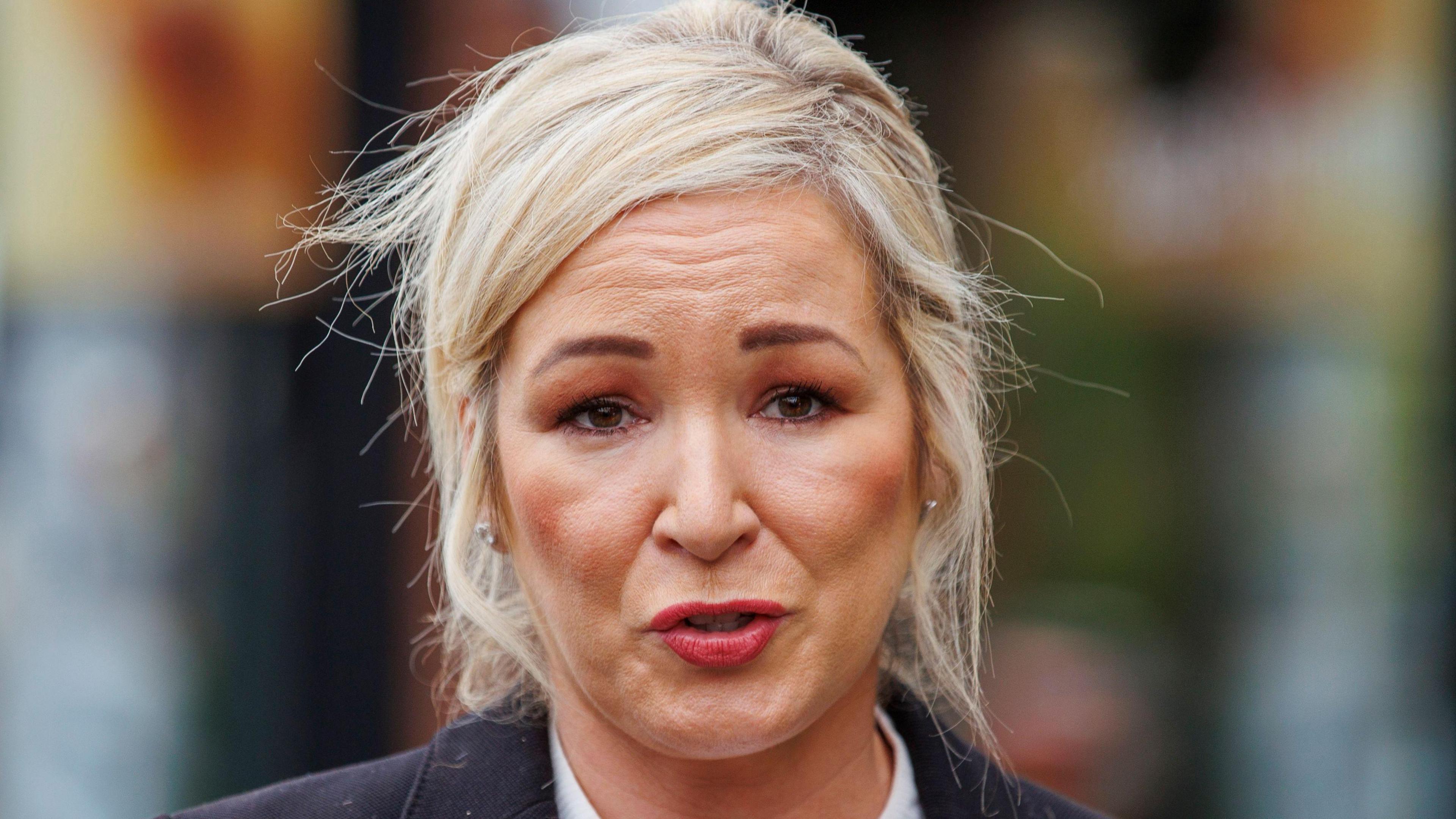Politicians playing out 'culture war' over Irish language, says Long

The justice minister says politicians need to stop "bickering over language issues"
- Published
A "culture war" is being played out by some politicians over implementation of Irish language policies in Northern Ireland, Alliance leader Naomi Long has said.
She made the remarks after incoming Irish language commissioner Pol Deeds accused the executive office of "failing in their duty of care" to his role.
It follows newspaper reports of threats from some loyalist paramilitaries to burn Belfast City Council facilities after the council voted to approve a new policy to extend the use of Irish across the city.
Long, who is also Stormont's justice minister, described those reports as "unacceptable" and said politicians needed to stop "bickering over language issues".
Last week, Belfast City Council voted to approve a new Irish language strategy but it faced criticism from unionist politicians who said their community's concerns with it had been "ignored".
Some loyalist paramilitaries in response made threats against the council, Sunday Life, external has reported.
Deputy First Minister Emma Little-Pengelly has said there is "no evidence" that some loyalist paramilitaries have threatened Belfast City Council facilities.
She said she had spoken to the PSNI Chief Constable Jon Boutcher on Monday about the issue, after the allegations were reported in the paper.
"I took the opportunity this morning to speak to the chief constable, he has confirmed to me at this stage they are not aware of any allegations or the detail of that."
Mr Deeds - who has been named as the Stormont Irish language commissioner but has yet to start his job - posted on social media about the issue, adding: "By failing to come out and defend their own policy - and UK law - TEO (the executive office) are failing in their duty of care to the new commissioner before he has even taken up his new role."
Irish language group Conradh Na Gaeilge called for Stormont's party leaders to issue a joint statement condemning the threats and to allow the commissioner to start his role "without any further delay".

First Minister Michelle O'Neill refused to be drawn on Mr Deeds' criticism
First Minister Michelle O'Neill said it was important that Mr Deeds - and the incoming Ulster-Scots commissioner Lee Reynolds - "get off to the best possible start".
But she refused to be drawn on Mr Deeds' criticism of the executive office, which O'Neill jointly leads with the DUP's deputy first minister.
Asked about the matter on Monday, Long said politicians needed to stop "rehashing tried and tested wedge issues".
"One of the reasons Belfast City Council brought this policy was to stop the war of attrition on the Irish language," she said.
"I had hoped with the announcement of commissioners we would see a similar approach being taken by the executive office. There is a culture war being played out here on a number of fronts."
She added that politicians - and suggested that some parties - were using it as a means of "differentiating" themselves ahead of the next assembly election.
'Divisionary and discriminatory' - Brett
Speaking in the assembly chamber, DUP assembly member (MLA) Phillip Brett said the policy being taken forward by Belfast City Council was "divisionary and discriminatory".
The policy would lead to the council adopting English-Irish signage at its facilities, as well as a new bilingual logo for vehicles and uniforms.
Brett said the DUP and other unionist parties would seek to challenge the policy in court because they wanted to ensure "the unionist community will not sit down and be quiet in the corner like some of the other parties expect us to be".
What will the commissioners do?
The Irish language commissioner's main role is to advise and set standards for public bodies on how best to use Irish.
The commissioners will also investigate complaints when those bodies fall short of services to Irish speakers.
The Ulster Scots commissioner will also encourage and monitor how public bodies deliver services in Ulster Scots.
But under the legislation the first and deputy first ministers "acting jointly may direct the commissioner in relation to the exercise of the commissioner's functions".